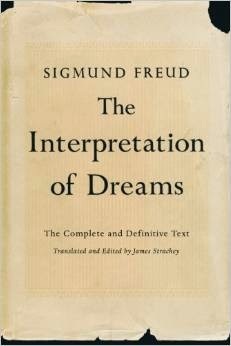
Gennady Barabtarlo's TLS piece ("Textures of Time, " 10/31/14 ) recounts an experiment that Vladimir Nabokov conducted between October of 1964 until January 3, 1965 in which he wrote down his dreams. Barabtalo explains,
"The point of the experiment was to test the theory that dreams can be precognitive as well as retrospective."
According to Barabtarlo, Nabokov was testing the theories outlined by J.W. Dunne in his An Experiment with Time (Studies in Consciousness) (1927). Barabtalo's TLS piece also provides some sample dreams which are unavoidable fodder for the kinds of simplistic interpretation Nabokov would have enthusiastically discountenanced. Only a comically deluded character in a Nabokov novel would be grandiose enough to take on the psyche of the master. But here's a go. On November 22, l964 Nabokov dreams he's in a "lecture-hall." His father is speaking. Nabokov is plainly interested in what his father has to say and he's taking notes. At one point after Nabokov clears his "throat a trifle too loudly," his father unjustly reprimands him thusly,
"Even if you are bored you might have decency to sit quietly."
If you noticed a tremor in your computer, it's Nabokov coming back from the afterlife in attempt to cut off the oncoming oedipal interpretation at the pass. On October 16, l964, Nabokov dreams that he is "dancing with Ve" (his wife Vera). He comments,
"A man kisses her in passing. I clutch him by the head and bang his face with such vicious force against the wall that he almost gets meat-hooked on some fixtures on the walls."
OK, OK! Why belabor the obvious? Oedipus here, Oedipus there, Oedipus everywhere. Nevertheless our psychoanalytically oriented sleuth can't help himself. And finally there's October 14, l964. Here Nabokov dreams about running by a "carriage:"
"A stranger in the cab (round face, oldish) asks me in Russian (or German?) am I well off? Criticizes my clothes (those I wear to-day) I explain that the spots on my trousers (which are browner than any I wear to-day) are due to my splashing across a puddle."
Thundering and lightening from the heavens, but alas nothing can stop the avalanche of earth bound rumination. Our sleuth is certainly having a party with this one to the extent that Nabokov was a Russian émigré, a displaced aristocrat, who lead a hardscrabble life in Berlin(where his father was assassinated). Is our sleuth being too simplistic in concluding that the puddle may be the Russian Revolution with the stains on our esteemed author's pants representing his decline in social status?
{This was originally posted to The Screaming Pope, Francis Levy's blog of rants and reactions to contemporary politics, art and culture}